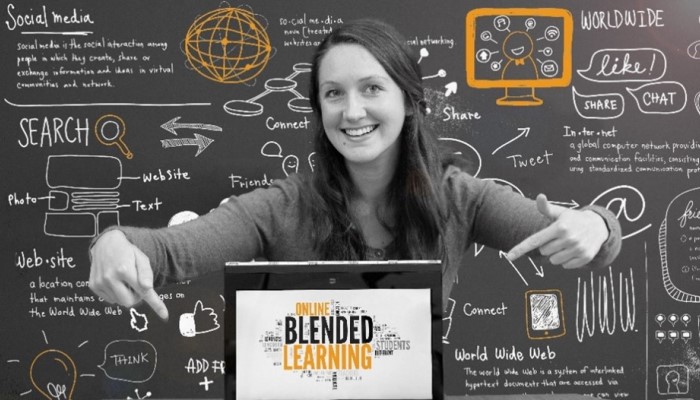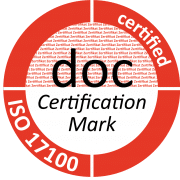Laura Blackburn on the digital trends in learning and development
The learning and development industry is evolving at a rapid pace, supercharged by a global pandemic. Our Business Development Manager, Laura Blackburn, stays ahead of the curve by attending conferences such as the LEARNTEC xChange. Read on to find out about all the new tricks, tools and trends!
Can you give us a short summary what LEARNTEC xChange is and what you enjoyed most about it?
The LEARNTEC xChange was an event over three days comprising webinars, online lectures and discussion rounds on topics surrounding the digitalisation of the learning and working world. In the past, we have attended the LEARNTEC in Karlsruhe and were happy to discover this event as a digital alternative.
I enjoyed the variety of talks available and getting inspiration from forward-thinking experts.
How do you rate the virtual conference format compared to in-person events?
The digital platform was one of the best I’ve experienced so far. The webinars ran smoothly, and each session was well moderated. Questions from the audience were integrated and made the sessions more interactive – arguably even more so than the in-person events.
It is also more accessible to attend from the comfort of my home! Of course, recreating the networking experience is a real challenge. The ‘get together’ sessions provided a good alternative to small discussions and guests were able to reach out to each other and set up meetings.
3 trends in learning and development
- Learning is becoming more self-determined and informal
- Access to learning has improved, levelling the playing field
- Content curation will be a priority as the offering is becoming increasingly overwhelming
What are the skills that companies are trying to build in 2021?
Self-organisation, meta-skills, digital competency and a philosophy of limitless learning. The Next Skills Profiles identifies classic skills such as communication and cooperation competences as remaining as important as ever, now paired with digital literacy and the ability to reflect and project.
How has COVID-19 impacted the learning landscape?
The obvious answer is that COVID-19 has accelerated the move to virtual solutions. However, the true fall-out won’t be known until the pandemic is over. I believe a large amount of training will remain virtual going forward. The surge in E-Learning services and their relative success (from current statistics) shows that such solutions are popular, above all for their flexibility and variety. I think there are very few negative sides to this – more access to learning can only be a good thing! Having said that, some training – especially intercultural or soft-skills – will always be preferable in-person and will return when it’s safe. But they’ll remain the exception (and need to be exceptional!).
How will the role of trainers change in the future?
Face-to-face training will be something of a special occasion and therefore the facilitation of these sessions will need to be high-quality. Trainers holding virtual classes will first and foremost need to be able to move with the times and adapt to demand. Additionally, they’ll have to be prepared to work harder to keep their participants’ attention and add real value to their learning experience. There are so many digital tools to supplement the virtual classroom, but the key will be finding a couple that align with learning goals and support the learners. In our business specifically, we’re teaching (English) business skills, and this means understanding the challenges our clients have in their daily business lives. If they’re doing all their business virtually, our trainers need to grasp what that means and be able to bring those skills to the lessons.
Did you come across any new learning or teaching software that you’d like to implement at EnglishBusiness?
We’ve highlighted MIRO as key software for our seminars and have been working hard on implementing this wherever it adds value. A main pillar of our seminars is collaborative interactivity, and it has been important for us to find a tool which lets us recreate as much of the live experience as possible.
Internally we also moved to Microsoft Teams just before the pandemic hit and have been discovering a lot of new tools within the Microsoft universe. For example, we’re experimenting with creating a social learning space for our freelance colleagues within this – a place where we can make training materials available to them and encourage further development, but they can also exchange tips and materials amongst themselves. This is something we’ve always done live in monthly meetings until now.
One of EnglishBusiness’ areas of focus is cross-cultural communication. How relevant is this skill today?
More relevant than ever! Not only are we seeing with increased remote teams that our colleagues and clients can be located anywhere in the world, adding complexities to our interactions, but for us at EnglishBusiness, ‘cross-cultural’ doesn’t strictly mean ‘cross-national’. Our individual culture and thereby the way we behave is shaped by a wide variety of influences. It’s about opening up the dialogue to better understand your team. Teams are dynamic, people are complex and successful communication is a lifelong study – I can’t imagine a scenario where this wouldn’t be a vital skill! This is one of the reasons our Cross-Cultural Simulation remains so popular as a team-building activity, whether with international teams or not – unfortunately we haven’t quite figured out how to hold this virtually yet but watch this space!
You have recently transitioned form Head of Learning & Development to Business Development Manager. What are your goals and challenges in the new role?
EnglishBusiness has, like many small companies, had a bit of a bumpy year due to COVID-19. A major challenge for all of us and particularly someone starting out in a business development role under these conditions, like myself, will be to keep long-term clients onboard while winning new contracts in an industry which has shifted immensely.
Apps and E-Learning can build a great foundation, but we’re convinced that human-to-human interaction still provides one of the best learning experiences and that’s where our expertise lies.
Suddenly, our competitors are not only primarily Hamburg-based language and soft skills providers, but also include tech companies spread worldwide. EnglishBusiness sees value in keeping the human element to training; apps and E-Learning can build a great foundation, but we’re convinced that human-to-human interaction still provides one of the best learning experiences and that’s where our expertise lies. A big goal for me is to find my voice within the role – I’ve been in the industry for almost 10 years (!) and I know EnglishBusiness, its clients, the trainers and our products inside out. Now, the goal is finding the best way for me to share this knowledge with decision makers.
One thing I’ve enjoyed thus far has been the relative ease with which I can meet new contacts through video calls – much nicer than a phone call and less organisation than a visit. Of course, it would be great in future to be able catch up over coffee again!
How does attending a conference like LEARNTEC xChange help you in your daily work?
Inspiration! Sitting at my desk (at home by myself due to COVID-19) and checking things quietly off my to-do list, it’s quite easy to forget that we work as one small part of a huge industry, full of companies passionate about learning and development. Attending conferences and trade fairs is a reminder that things are constantly moving and is a great motivator. Also, being able to see innovative solutions and developments within learning and seeing how things are being done at other companies is a great way of finding small things that can be adjusted within my own role or in the company. There’s also the opportunity for networking with peers and of course it’s a bonus if we manage to get some new business out of attending, too!
What new products is EnglishBusiness working on?
Our focus in the past year has been on adapting our current courses to the digital sphere and helping our trainers get comfortable using new software. Our language and skills seminars run over 2 full days when held face-to-face. We know that in a virtual setting this isn’t practicable, nor is it going to get the best results. Therefore, we’ve broken down the sessions into shorter chunks and supplemented them with offline activities where applicable. This has proven popular and as an additional bonus allows for participation of colleagues across time-zones.
We’ve also started offering a 60-minute unit for one-on-one classes. In speaking with our clients and trainers, we’ve recognised that virtually this works well for the client, and as the trainer saves on travel time, it also allows them to be more flexible.
One completely new product we have added to our portfolio is an online writing module. Teaching writing skills in a classroom, face-to-face or virtual, is often not the best use of contact time. This package allows learners to work in their own time on written tasks common in business correspondence, with suggested phrasing and model answers for comparison. Arranging a meeting or answering a customer enquiry, for example. We believe this complements our current products nicely and provides an option for anyone who struggles mainly with written communication.
Do you have a question for Laura? Get in touch to discuss how you and your team can keep learning!
















